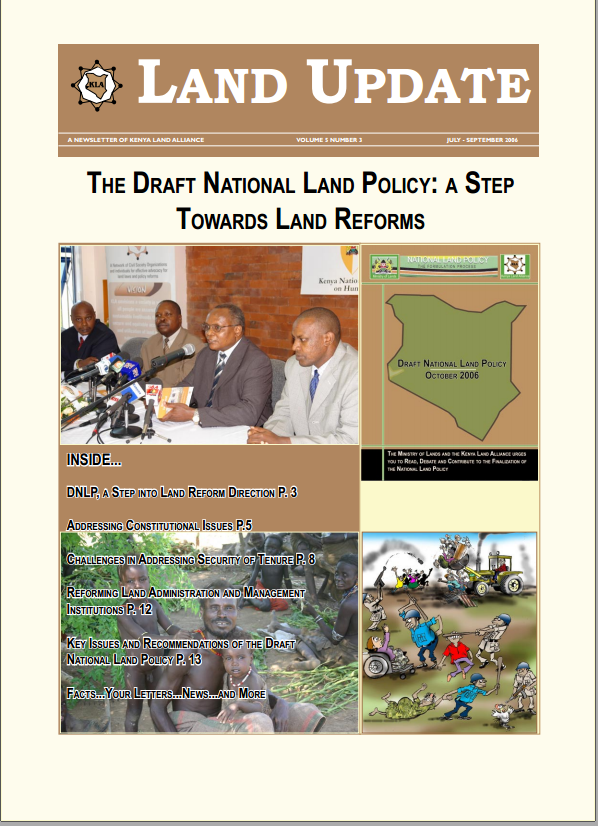The Kenya Land Alliance (KLA) is a not-for-profit and non-partisan umbrella network of Civil Society Organisations and Individuals committed to effective advocacy for the reform of policies and laws governing land in Kenya. KLA was founded in 1999 and registered as a Trust in 2001. The initiative to create an institutional framework for land laws and policy advocacy in Kenya was necessitated by the realization that the policy, legal and institutional framework created in 1950’s had become inadequate due to many changes in the social, political, economic and cultural fronts that had occurred in the country over the years.
The increased population has resulted in intense competition for access to land and natural resources. In addition, changes in the global environment brought about by globalization have combined to create a reality that is significantly different from the one existing when the
current framework was created in the 1950s. It is on this premise that KLA has been in the forefront in efforts towards effective advocacy for land laws and policy reforms in Kenya, as recently witnessed in the Presidential Commission of Inquiry into the Land Law System of
Kenya and the Constitution of Kenya Review Commission. Advocating for the formulation and implementation of a National Land Policy and review of land laws.
Our Vision
A society in which all people are assured of sustainable livelihoods through secure and equitable access and utilisation of land and natural resources.
Our Mission
To facilitate the activities of members by gathering and disseminating information towards an all-embracing, participatory and comprehensive land policy and law reforms in Kenya.
Members:
Resources
Displaying 41 - 45 of 76Women, Land and Property Rights and the Land Reforms in Kenya
Includes key policy concerns and recommendations, the Draft National Land Policy of 2006.
The Draft National Land Policy: A Step towards Land Reforms
Through this Land Update, KLA appreciates that for the first time in the history of Kenya a comprehensive Draft National Land Policy has been formulated.We therefore urge all Kenyans and the general public to read, debate and contribute to the finalization of the National Land Policy. This is because the final National Land Policy will provide the basis for the review and harmonization of the existing laws and enacting of new ones to facilitate the achievement of the objectives set out in the overall national development policy framework, Kenya Vision 2030
Relevance of the World Social Forum to the Kenyan Situation
The World Social Forum in Nairobi in January 2007 was a timely New Year rallying event for Kenyans to revisit the fundamental principles for building a democratic and sustainable society as we prepare for December 2007 elections.The current organizing principles of the institutions that govern us in Kenya are narrow and serve the few at the expense of the many millions of Kenyans that live in abject poverty. Yet, from all corners of the country it is acknowledged that it is within our collective ability to create a healthy and sustainable society that serves and work for all
Kenya Land Alliance Land Update 5.3, July – September 2006
Includes the Draft National Land Policy – a step into land-reform direction, addressing constitutional issues, challenges in addressing security of tenure, reforming land administration and management institutions, key issues and policy recommendations of the DNLP, news.
Unjust Enrichment. The Making of Land Grabbing Millionaires. Abetting Impunity: the other side of the Ndung’u Report on Illegal and Irregular Allocations of Public Land
Part of a series produced by KNCHR and KLA to enhance the protection of public resources and help the public demand greater accountability and transparency. Focuses on the plunder of Karura, Ngong Road, and Kiptagich Forests. Suggests a loss of public resources of Ksh.18.47bn. Offers an account of the human rights dimensions of land grabbing. Attempts to unmask those who did particularly well from the plunder. Urges the recovery of all monies unjustly got through illegal allocation of public land.




